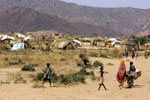
Two weeks ago, on the heels of the International Criminal Court arrest warrant issuance for Sudanese President Omar al-Bashir and Khartoum’s subsequent expulsion of 13 international aid agencies from the country, I wondered about how the developments in Darfur would impact the extremely volatile situation in eastern Chad. Aid agencies in eastern Chad are reportedly preparing for a “possible influx of tens of thousands of refugees from Darfur,” as the impact of Khartoum’s cynical decision to deny lifesaving humanitarian assistance to well over a million Darfuris is already taking a serious toll in camps throughout Darfur.
Eastern Chad is rife with banditry and awash in arms. The European Union peacekeepers mandated to protect civilians in camps for internally displaced persons, or IDPs, in the region were unable to improve the security situation inside and outside of these camps in the past year. The U.N. Security Council authorized a 5,000-strong peacekeeping force to replace the departing 3,360 EUFOR troops (this transition began on Sunday), but during the next eight months or more that it will take for the peacekeepers to arrive, the people of eastern Chad will have to make do with even less protection. The U.N.’s decision to approve more peacekeepers for eastern Chad is well reasoned, but given that the mandate of this new force—like that of its predecessor EUFOR—falls far short of what is needed to provide adequate civilian protection, it is hard to be too optimistic.
The dire situation in eastern Chad – coupled with predictions of a likely influx of more Darfuri refugees seeking the shelter and humanitarian assistance in Chad that they have been denied because of Khartoum’s deadly tactics – is cause for great concern. Khartoum must be held responsible not only for the deaths and displacements it is currently causing in Darfur by expelling the aid agencies, but also for its key role in worsening and compounding the humanitarian crisis in neighboring Chad.

